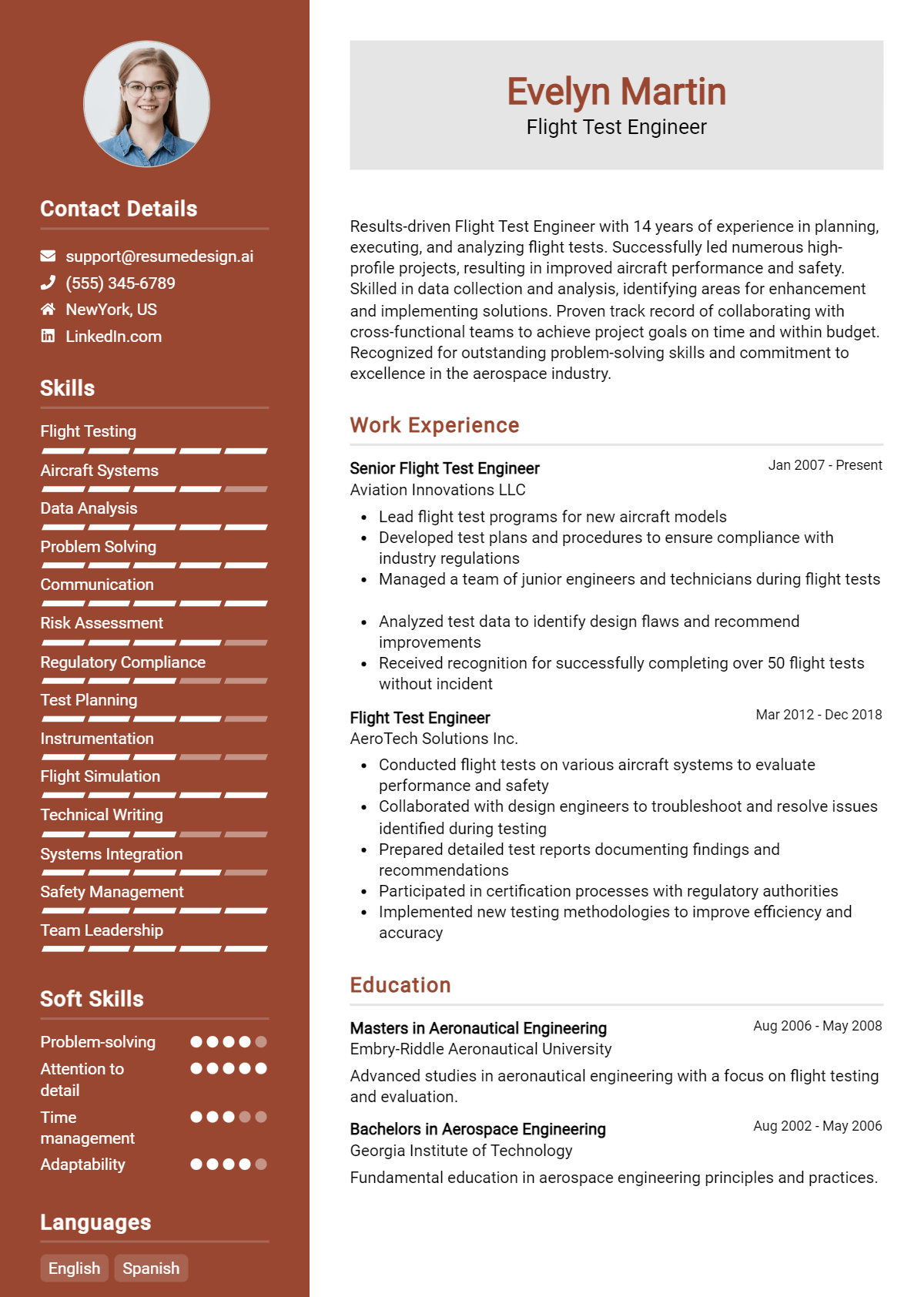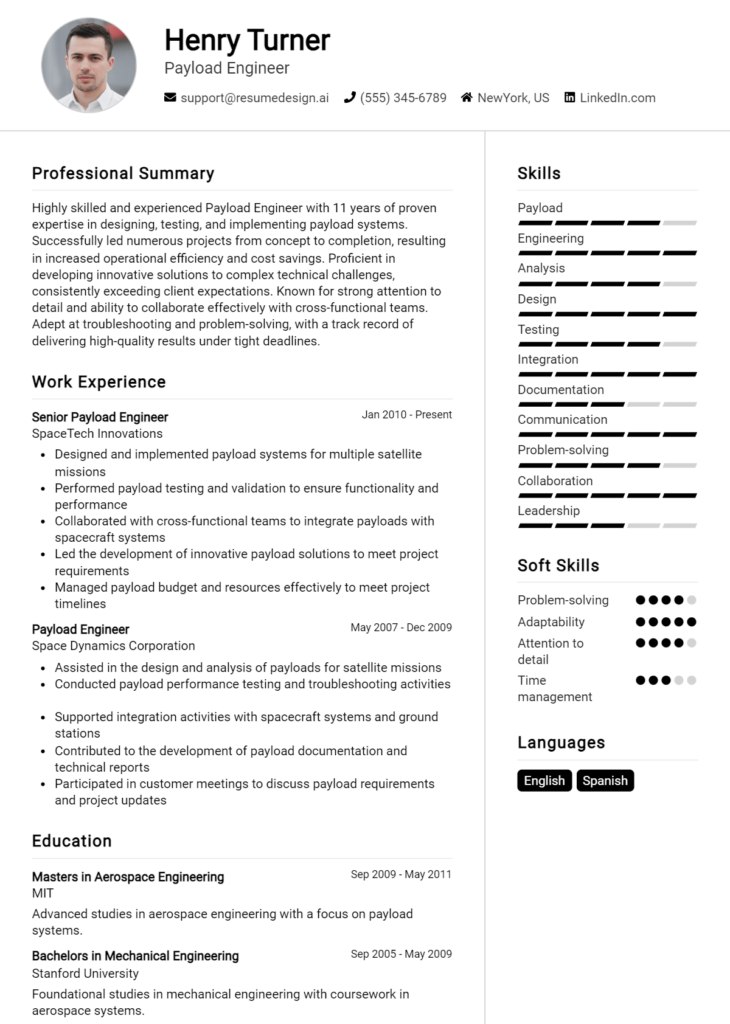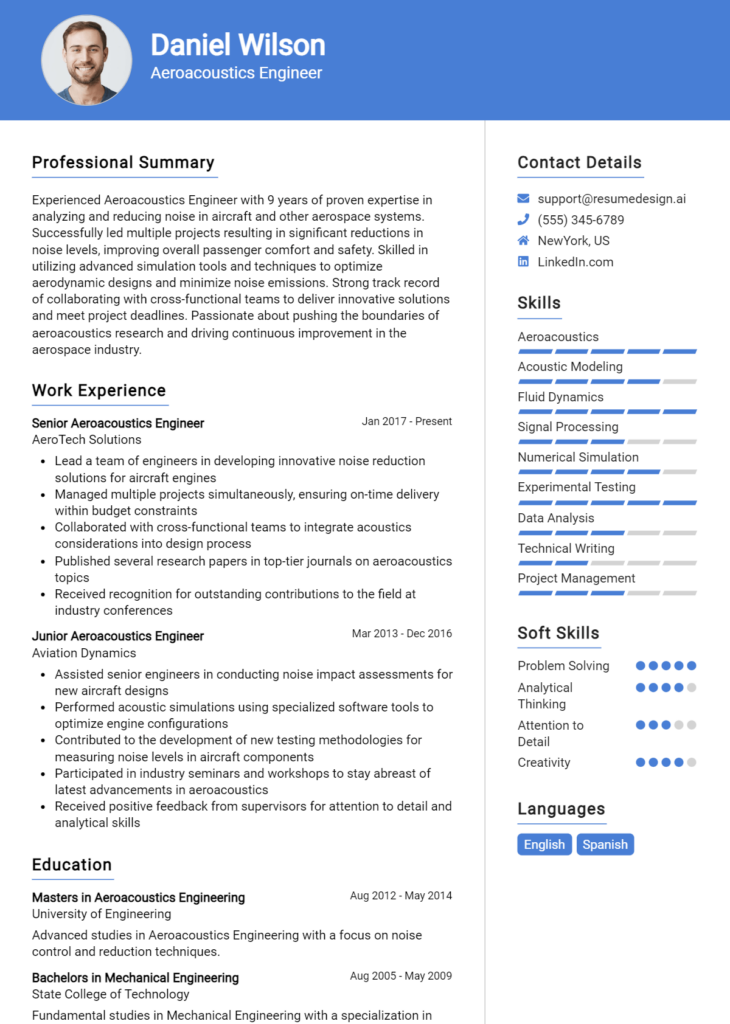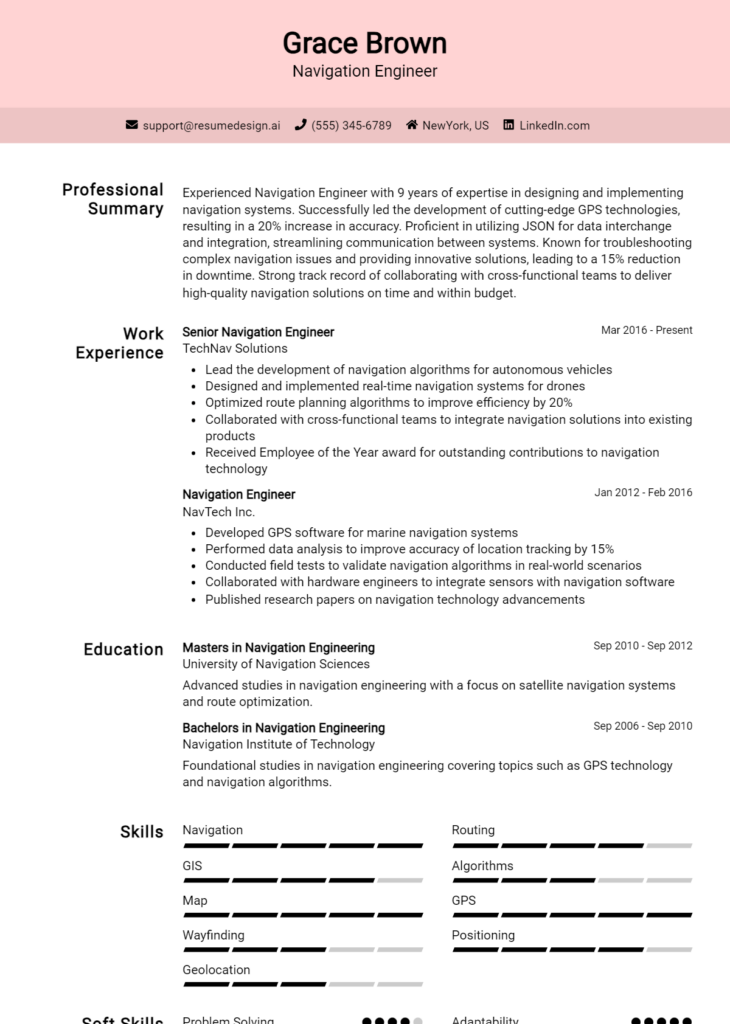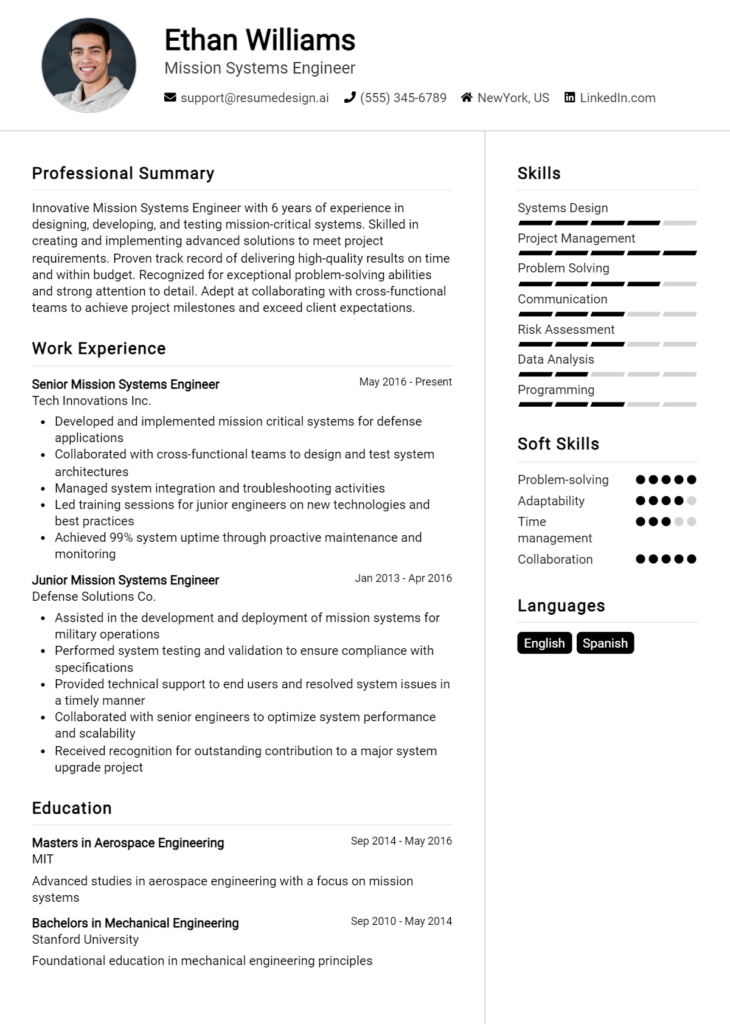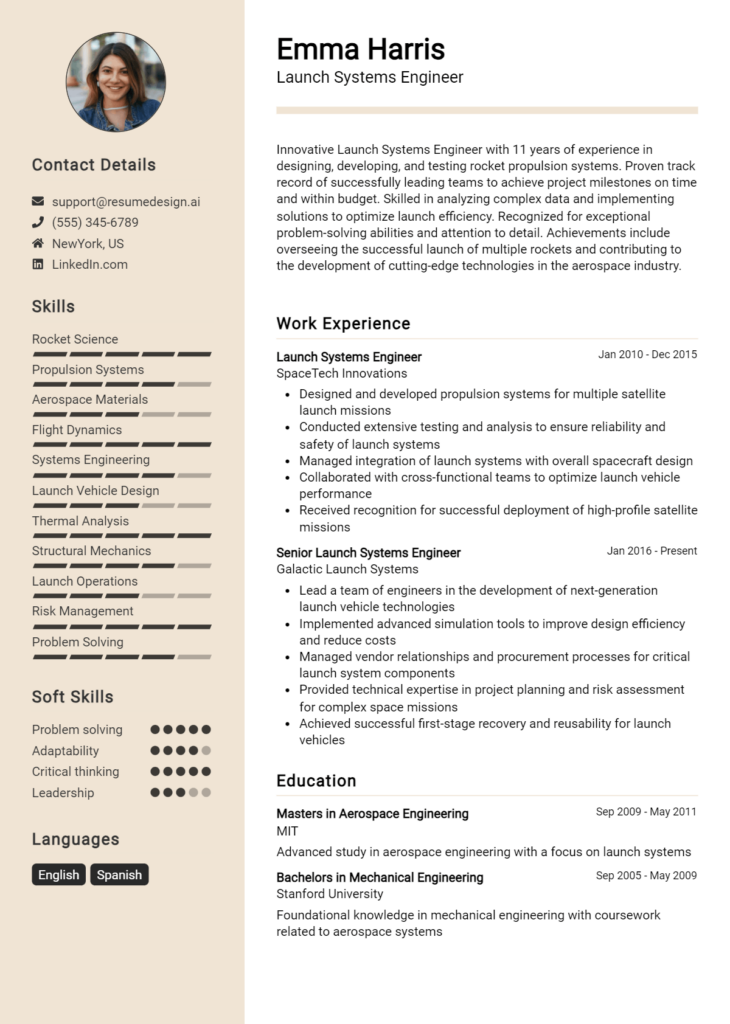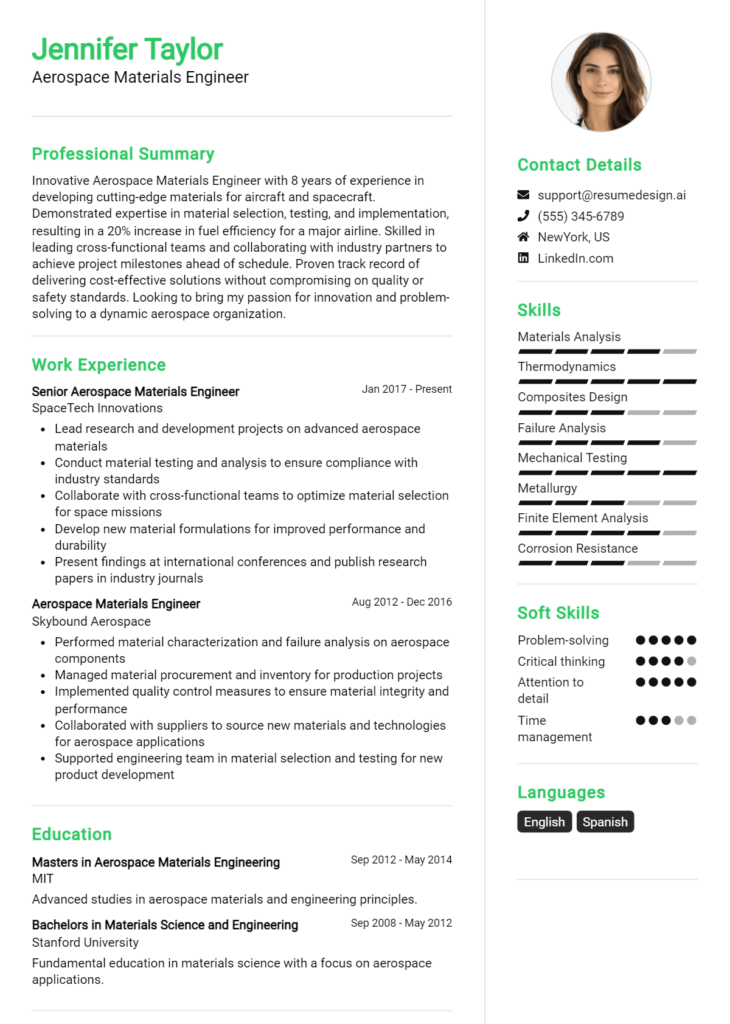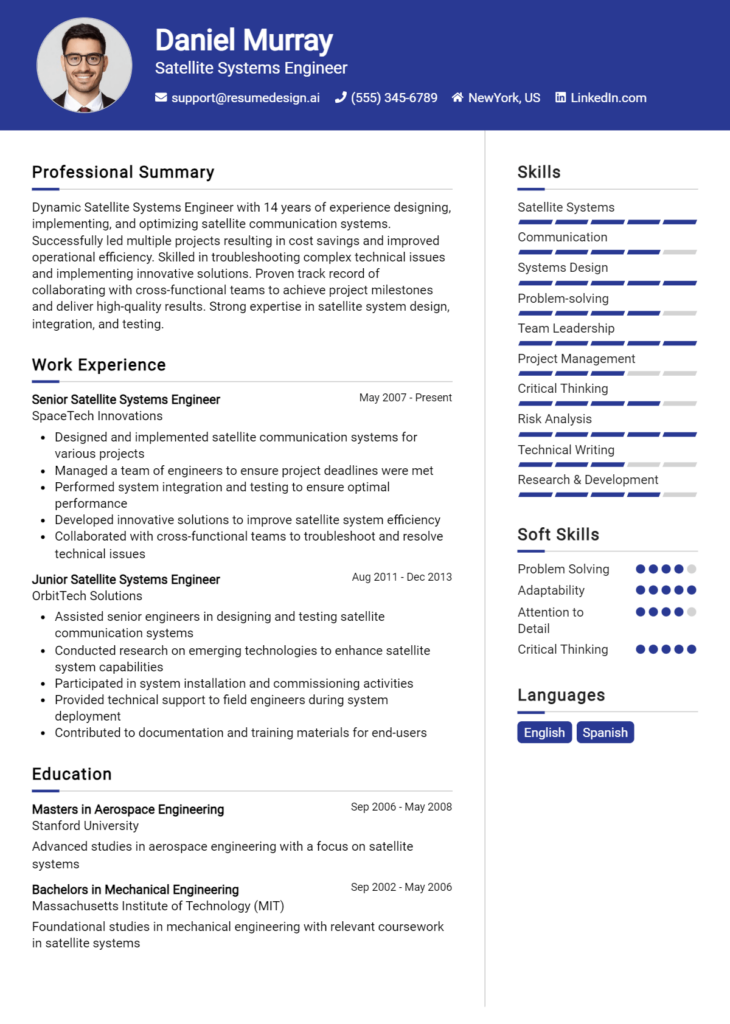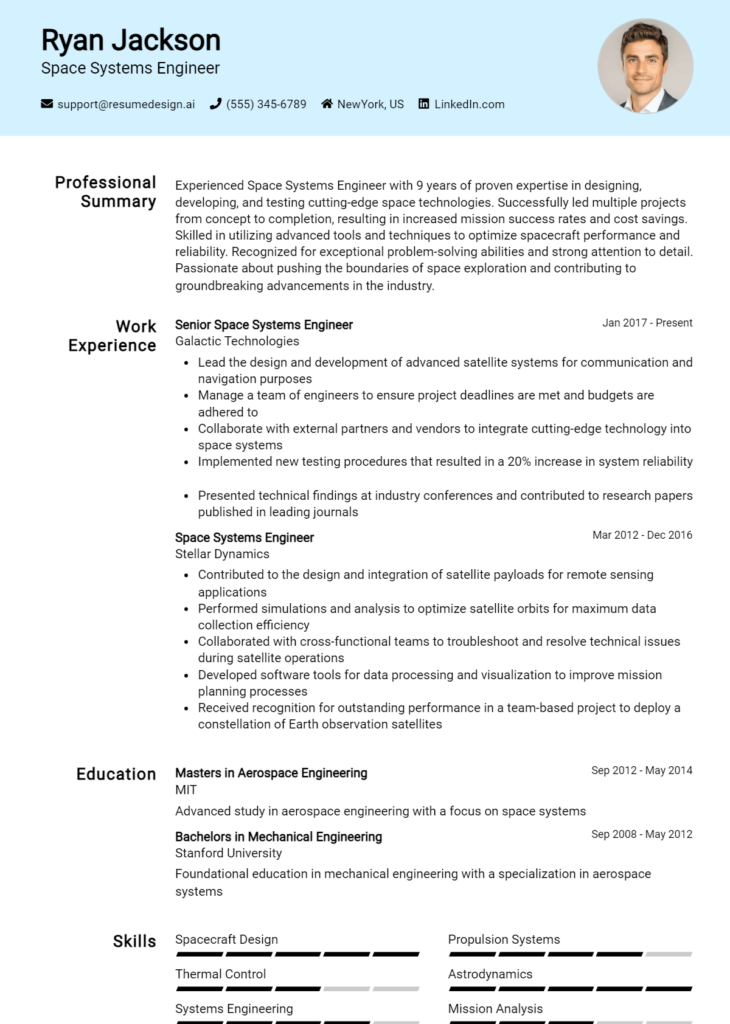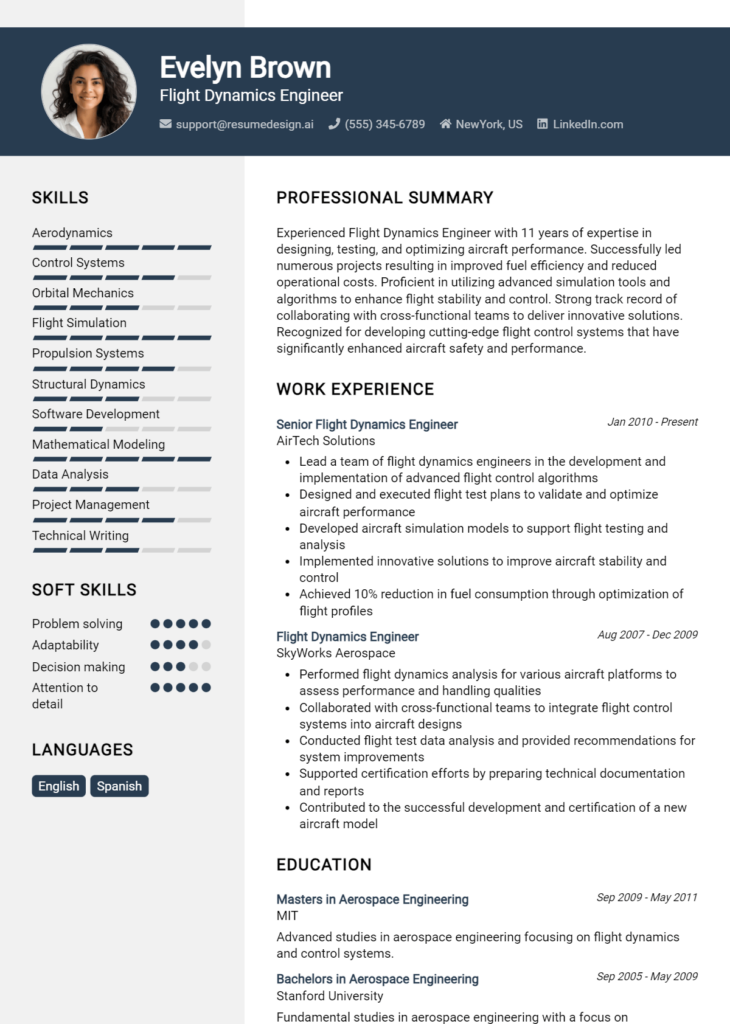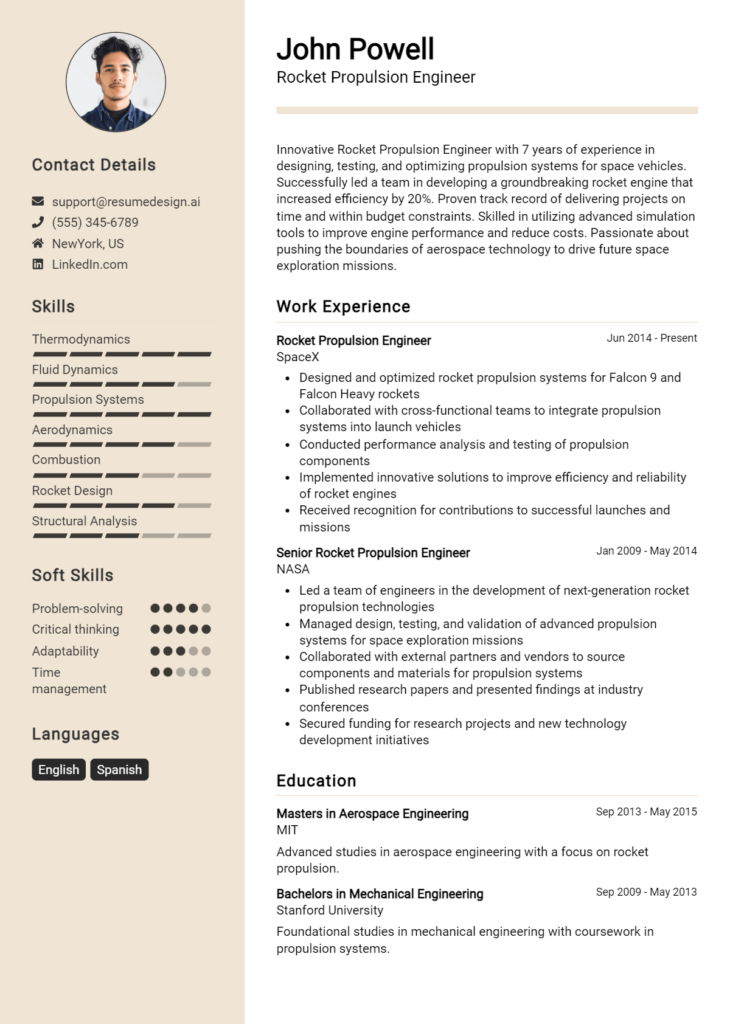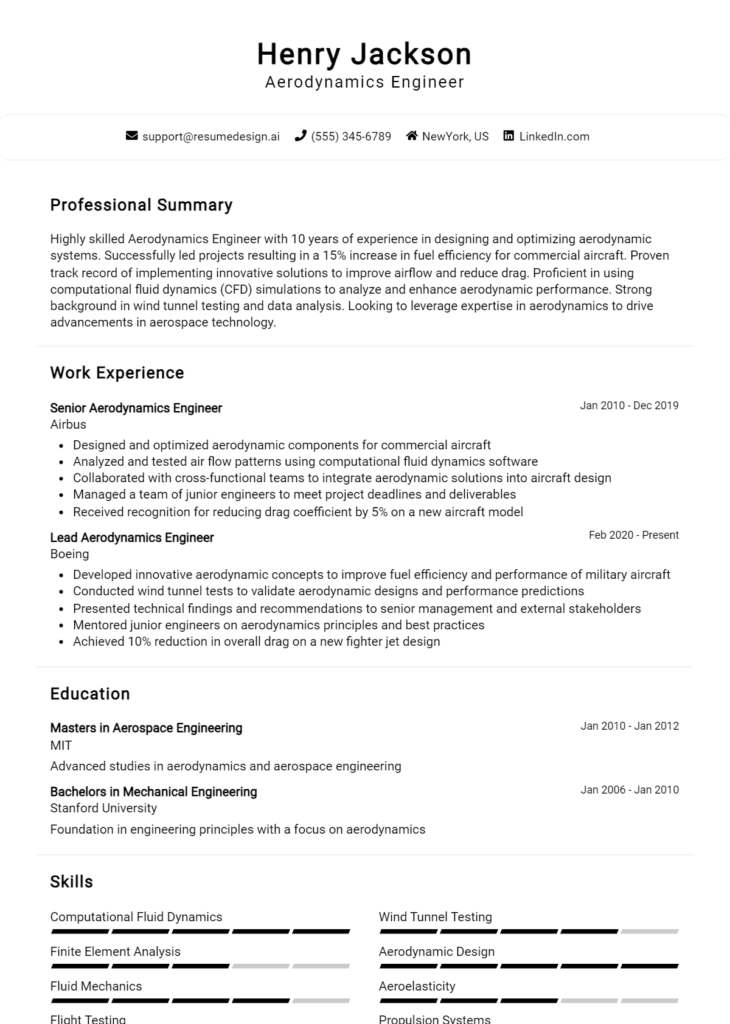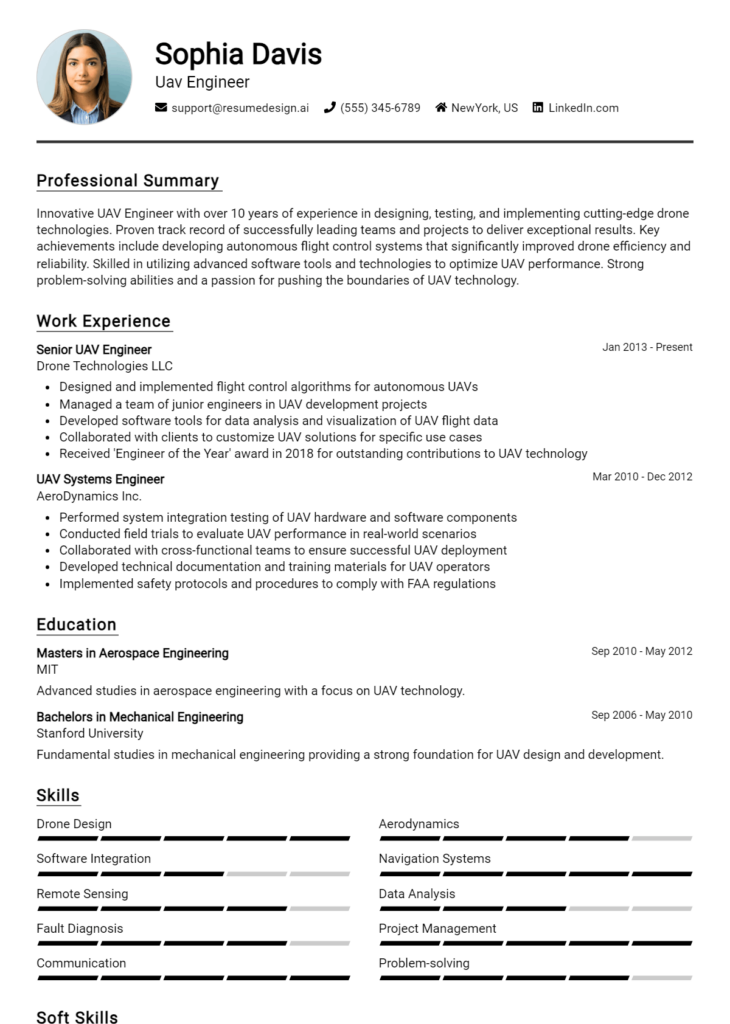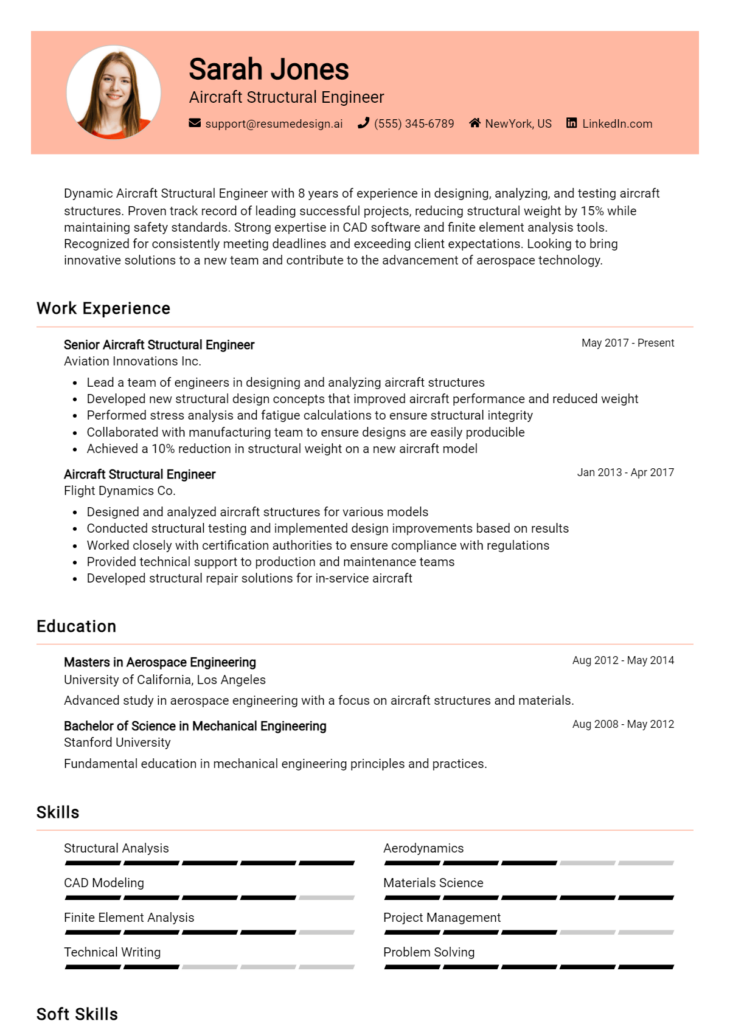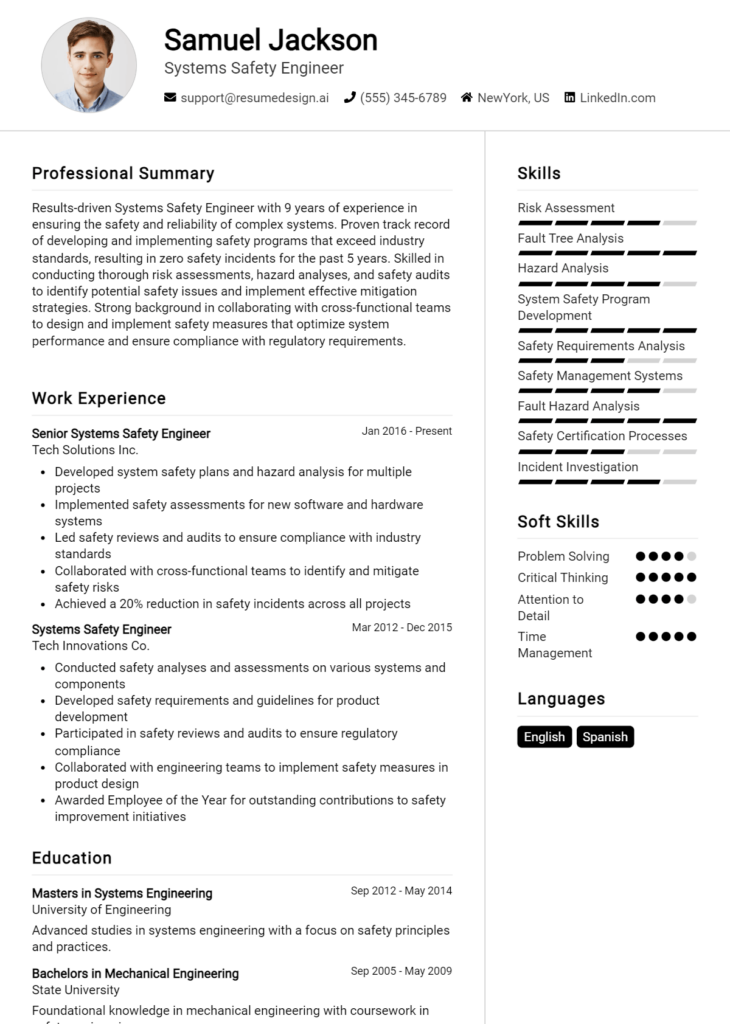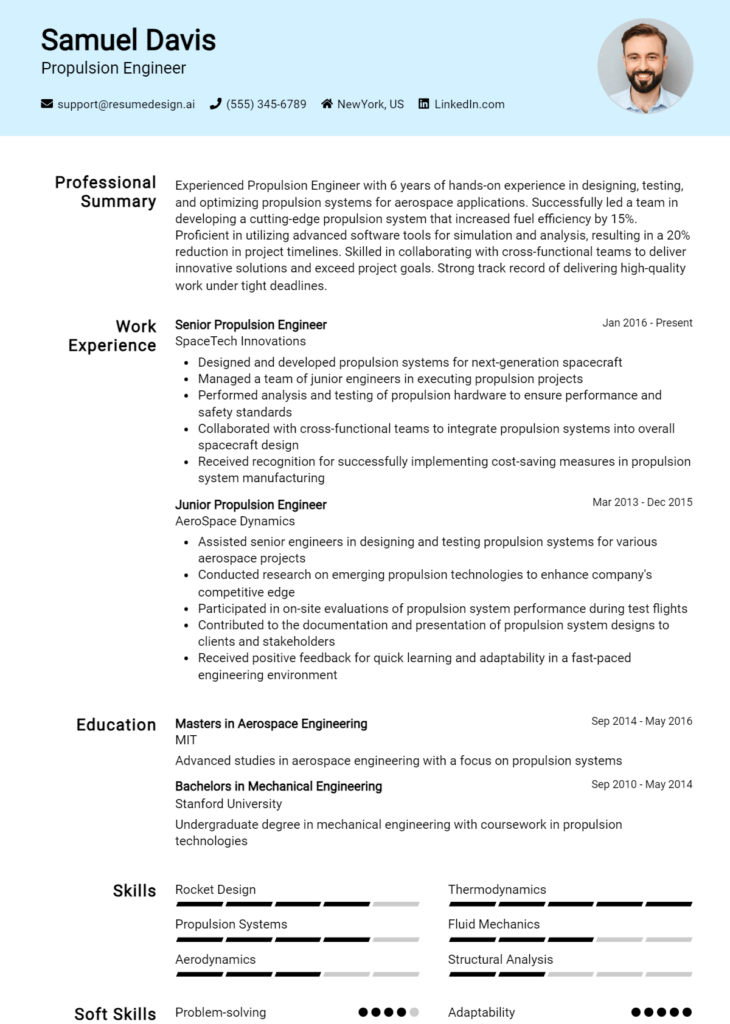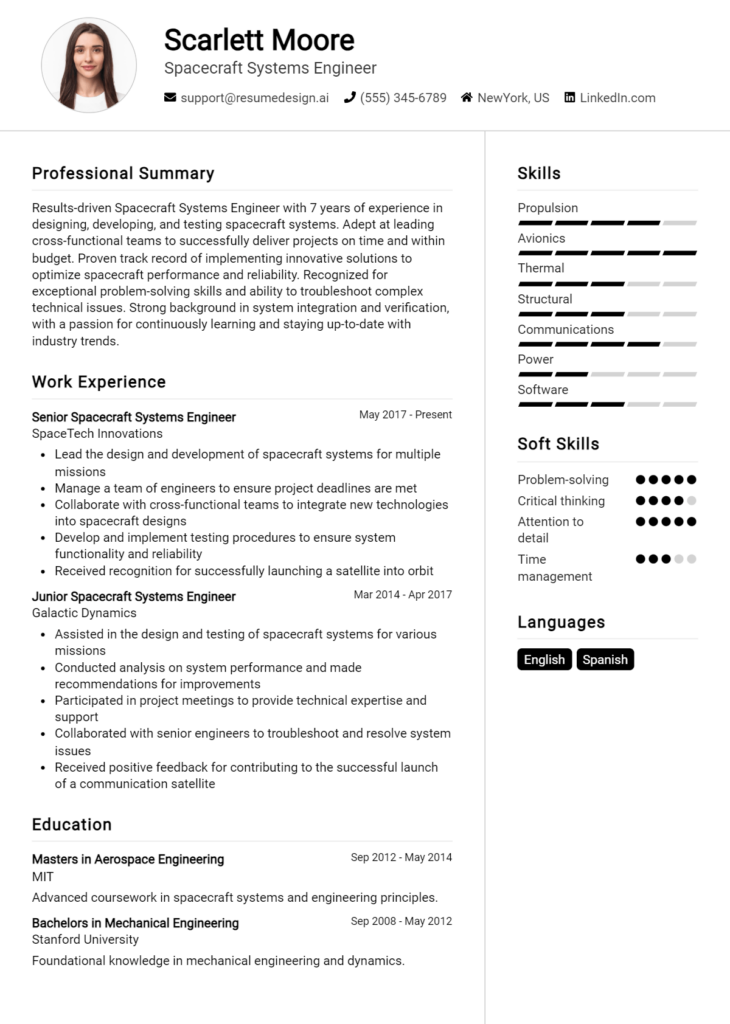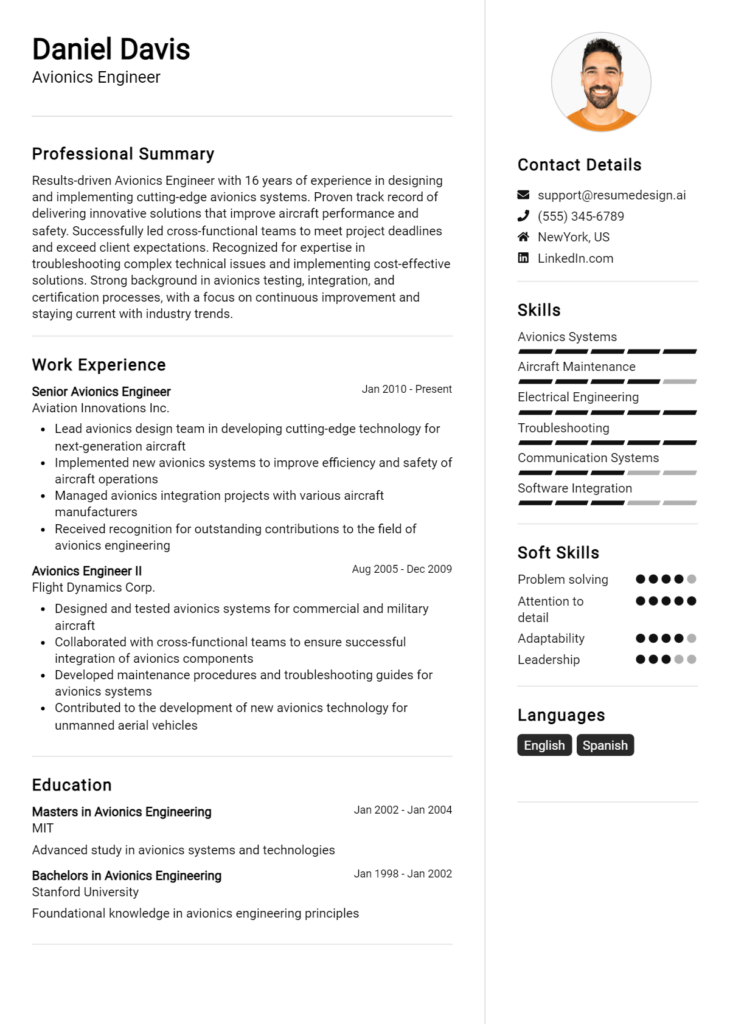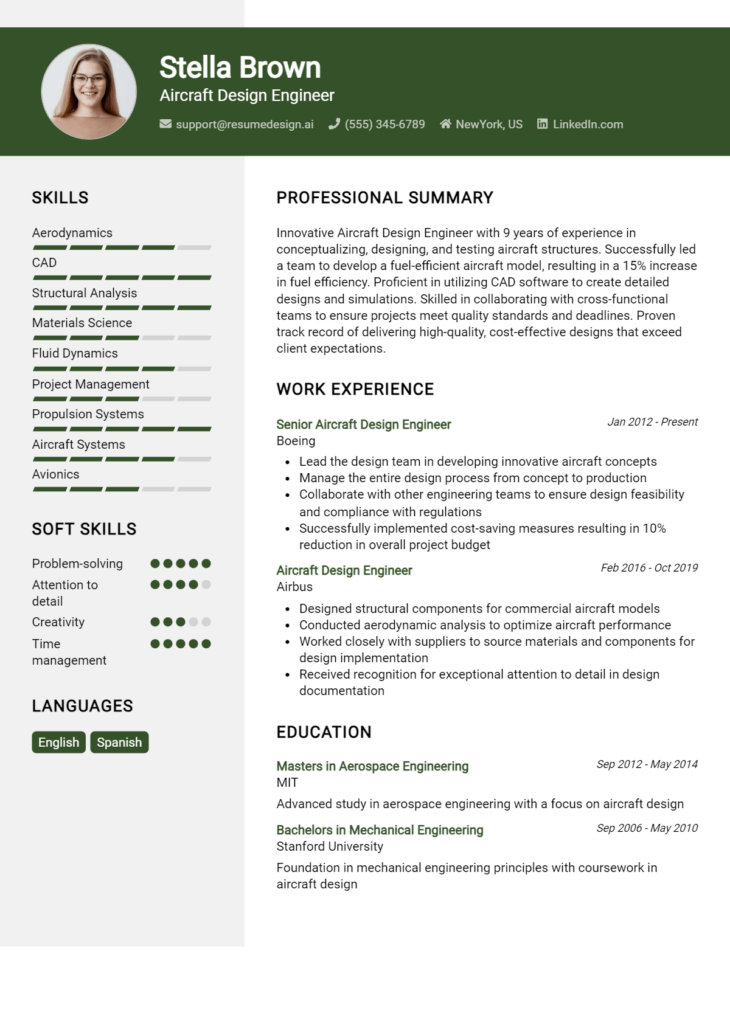Flight Test Engineer Core Responsibilities
A Flight Test Engineer plays a crucial role in the aerospace industry, integrating technical expertise with operational insights to ensure aircraft safety and performance. Key responsibilities include developing test plans, executing flight tests, and analyzing data to validate design specifications. This role requires strong problem-solving skills, communication abilities, and collaboration across departments such as engineering, manufacturing, and safety. A well-crafted resume highlighting these competencies can effectively demonstrate how a Flight Test Engineer contributes to the organization’s overall goals.
Common Responsibilities Listed on Flight Test Engineer Resume
- Design and develop comprehensive flight test plans and procedures.
- Conduct pre-flight, in-flight, and post-flight data analysis.
- Collaborate with engineering teams to assess aircraft performance metrics.
- Ensure compliance with safety protocols and regulatory standards.
- Document test results and prepare detailed reports for stakeholders.
- Identify and troubleshoot technical issues during flight tests.
- Participate in cross-functional meetings to discuss project progress.
- Utilize simulation tools to predict aircraft behavior and performance.
- Train and mentor junior engineers in flight test methodologies.
- Support the development of new testing technologies and processes.
- Coordinate with flight crews to ensure smooth test operations.
- Evaluate and implement improvements based on test feedback.
High-Level Resume Tips for Flight Test Engineer Professionals
In the competitive field of aerospace engineering, a well-crafted resume is crucial for Flight Test Engineer professionals looking to secure their next role. Your resume is often the first impression you make on a potential employer, serving as a window into your skills, experiences, and achievements. It is essential that your resume not only highlights your technical expertise but also effectively showcases your accomplishments and the value you can bring to an organization. In this guide, we will provide practical and actionable resume tips specifically tailored for Flight Test Engineer professionals, ensuring you present yourself in the best light possible.
Top Resume Tips for Flight Test Engineer Professionals
- Tailor your resume to the specific job description, emphasizing the skills and experiences that align with the requirements of the position.
- Include a strong summary statement at the top of your resume that captures your career objectives and pertinent qualifications.
- Showcase relevant experience, emphasizing roles that involved flight testing, data analysis, or systems engineering.
- Quantify your achievements with metrics where possible, such as improvements in test efficiency or reductions in error rates.
- Highlight industry-specific skills, such as proficiency in flight data analysis software, knowledge of FAA regulations, or experience with specific aircraft types.
- Utilize action verbs to describe your responsibilities and accomplishments, such as "Led," "Developed," and "Implemented."
- Include certifications or training relevant to flight testing, such as FAA certifications, safety training, or specialized software training.
- Keep your resume format clean and professional, using clear headings and bullet points for easy readability.
- Incorporate keywords from the job posting to pass through Applicant Tracking Systems (ATS) and catch the attention of hiring managers.
By implementing these tips, you can significantly enhance your resume and increase your chances of landing a job in the Flight Test Engineer field. A focused and polished resume not only highlights your qualifications but also demonstrates your professionalism and attention to detail, qualities that are highly valued in this industry.
Why Resume Headlines & Titles are Important for Flight Test Engineer
In the competitive field of aerospace engineering, particularly for the role of a Flight Test Engineer, having a well-crafted resume headline or title is crucial. A strong headline serves as a powerful first impression, instantly capturing the attention of hiring managers and offering a succinct summary of a candidate's key qualifications. It should be concise, relevant, and directly related to the job being applied for, allowing potential employers to quickly gauge the applicant’s expertise and alignment with the role. An impactful headline can set the tone for the rest of the resume, making it essential for candidates to invest time in creating a standout title that highlights their skills and experience.
Best Practices for Crafting Resume Headlines for Flight Test Engineer
- Keep it concise: Aim for a headline that is clear and to the point, ideally no more than 10 words.
- Be role-specific: Tailor your headline to reflect the specific position you are applying for, such as "Flight Test Engineer" or "Aerospace Test Specialist."
- Highlight key skills: Incorporate relevant technical skills or certifications, like "FAA Certified Flight Test Engineer."
- Showcase experience: If applicable, mention years of experience, e.g., "10+ Years in Flight Testing."
- Use action words: Begin with strong action verbs to convey a sense of proactivity, such as "Driving Safety in Flight Testing."
- Make it impactful: Choose words that convey your value, such as "Expert in Flight Test Analysis."
- Reflect achievements: Consider including notable accomplishments, like "Innovative Solutions for Flight Test Challenges."
- Stay professional: Avoid slang or overly casual language to maintain a professional tone.
Example Resume Headlines for Flight Test Engineer
Strong Resume Headlines
Dedicated Flight Test Engineer with 10+ Years in Aerospace Testing
FAA Certified Flight Test Engineer Specializing in Safety Protocols
Innovative Flight Test Engineer Driving Efficiency in Testing Procedures
Experienced Aerospace Engineer with Expertise in Flight Test Analysis
Weak Resume Headlines
Engineer Looking for a Job
Flight Test Professional
Aerospace Engineer with Various Skills
The strong headlines are effective because they are specific, convey a clear message about the candidate's qualifications, and highlight their unique strengths or experiences relevant to the Flight Test Engineer role. In contrast, the weak headlines fail to impress due to their vagueness, lack of specificity, and inability to communicate the value the candidate brings to the table. By avoiding generic terms and instead employing targeted, impactful language, candidates can dramatically improve their chances of capturing the attention of hiring managers.
Writing an Exceptional Flight Test Engineer Resume Summary
A well-crafted resume summary is crucial for a Flight Test Engineer as it serves as the first impression for hiring managers and recruiters. This brief yet powerful overview encapsulates a candidate's key skills, relevant experience, and notable accomplishments, effectively showcasing their fit for the role. A strong summary not only draws attention but also sets the tone for the rest of the resume, making it essential to be concise, impactful, and tailored to the specific job being applied for. By highlighting technical expertise and demonstrating how past experiences align with the prospective employer's needs, candidates can significantly enhance their chances of securing an interview.
Best Practices for Writing a Flight Test Engineer Resume Summary
- Quantify Achievements: Use specific numbers to highlight your contributions, such as the number of successful test flights or improvements in efficiency.
- Focus on Relevant Skills: Emphasize technical skills that are directly applicable to flight testing, such as data analysis, safety protocols, and aircraft systems knowledge.
- Tailor to Job Description: Customize your summary for each position by incorporating keywords and phrases from the job listing.
- Keep it Concise: Aim for 3-5 sentences that deliver maximum impact without overwhelming the reader.
- Showcase Technical Expertise: Highlight your proficiency in specific testing methodologies, software tools, or industry standards.
- Include Soft Skills: Mention relevant soft skills like problem-solving, teamwork, and communication that are valuable in a collaborative environment.
- Highlight Certifications: If applicable, mention any certifications or training that can set you apart from other candidates.
- Express Enthusiasm: Convey your passion for aviation and flight testing, which can resonate with employers looking for committed team members.
Example Flight Test Engineer Resume Summaries
Strong Resume Summaries
Dynamic Flight Test Engineer with over 8 years of experience in conducting flight operations on advanced aircraft systems. Successfully led over 50 test flights, resulting in a 30% improvement in data collection efficiency. Proficient in using MATLAB and Simulink for data analysis and modeling.
Detail-oriented Flight Test Engineer with a proven track record of enhancing flight safety protocols, leading to a 15% reduction in incidents during test flights. Expertise in aerodynamic testing and flight performance evaluations, backed by an FAA certification.
Results-driven Flight Test Engineer with extensive experience in developing test plans and executing flight tests for unmanned aerial vehicles (UAVs). Instrumental in achieving a 25% increase in test cycle efficiency through process optimization.
Accomplished Flight Test Engineer with 10+ years in aerospace engineering, specializing in avionics testing. Led a cross-functional team that successfully delivered 100% of scheduled test milestones on time while maintaining compliance with all safety regulations.
Weak Resume Summaries
Flight Test Engineer with experience in various aircraft and a strong background in engineering. Looking for a challenging position in the aerospace industry.
Dedicated engineer interested in flight testing and aircraft performance. Skilled in teamwork and problem-solving.
The examples of strong resume summaries stand out due to their specificity, quantifiable achievements, and relevance to the Flight Test Engineer role. They provide concrete evidence of the candidate's capabilities and accomplishments, painting a clear picture of their potential contributions to the employer. In contrast, the weak resume summaries lack detail and fail to demonstrate the candidate's unique qualifications, making them less impactful and memorable to hiring managers.
Work Experience Section for Flight Test Engineer Resume
The work experience section of a Flight Test Engineer resume is crucial as it serves as a reflection of the candidate's technical capabilities, leadership qualities, and the ability to produce high-quality outcomes in a challenging environment. This section not only highlights specific skills related to flight testing, data analysis, and safety protocols but also emphasizes the engineer's experience in managing teams and collaborating with cross-functional groups. By quantifying achievements—such as successful test flights, improvements in processes, or cost savings—and aligning these experiences with industry standards, candidates can effectively demonstrate their value to potential employers.
Best Practices for Flight Test Engineer Work Experience
- Use action verbs to initiate bullet points and convey a sense of proactivity.
- Quantify achievements with metrics, such as percentage improvements or cost reductions.
- Highlight specific technologies, tools, or methodologies that demonstrate technical expertise.
- Showcase collaborative projects that illustrate teamwork and communication skills.
- Align experience descriptions with industry standards and terminology.
- Focus on results-driven outcomes that demonstrate the impact of your contributions.
- Include relevant certifications or training that enhance your qualifications.
- Tailor your experiences to match the job description of the position you are applying for.
Example Work Experiences for Flight Test Engineer
Strong Experiences
- Led a team of 10 engineers in the successful execution of over 50 flight tests, resulting in a 30% reduction in development time.
- Developed an advanced data analysis tool that increased the accuracy of flight test data interpretation by 25%.
- Collaborated with cross-functional teams to implement safety protocols, reducing incident rates by 40% during testing phases.
- Managed the integration of a new avionics system, enhancing operational efficiency and contributing to a 15% increase in overall aircraft performance.
Weak Experiences
- Assisted with flight tests and other tasks.
- Worked on various projects without specifying achievements or outcomes.
- Participated in team meetings to discuss flight testing procedures.
- Helped with data collection during tests.
The examples categorized as strong are considered effective because they provide specific, quantifiable outcomes and demonstrate leadership, technical skills, and collaborative efforts that align with industry standards. In contrast, the weak experiences lack detail and measurable accomplishments, making them less impactful in showcasing the candidate's potential value to an employer.
Education and Certifications Section for Flight Test Engineer Resume
The education and certifications section of a Flight Test Engineer resume plays a critical role in showcasing the candidate's academic foundation and commitment to professional development. This section not only highlights relevant degrees and industry-recognized certifications but also reflects the candidate's dedication to continuous learning in a rapidly evolving field. By providing information on pertinent coursework, specialized training, and advanced credentials, candidates can greatly enhance their credibility and demonstrate their alignment with the specific requirements of the flight test engineering role.
Best Practices for Flight Test Engineer Education and Certifications
- Focus on relevant degrees: Prioritize degrees in aerospace engineering, mechanical engineering, or related fields.
- Highlight industry-recognized certifications: Include certifications from reputable organizations such as the Society of Automotive Engineers (SAE) or the International Society of Automation (ISA).
- Detail specific coursework: Mention coursework that directly relates to flight testing, such as aerodynamics, flight dynamics, and systems engineering.
- Showcase advanced degrees: If applicable, include any master's or doctoral degrees that enhance your qualifications.
- Include specialized training: List any training programs specifically related to flight testing, such as simulation training or test pilot school.
- Stay updated: Regularly update this section as you earn new certifications or complete relevant courses.
- Be concise yet informative: Provide enough detail to convey expertise without overwhelming the reader.
- Use proper formatting: Ensure clear presentation of degrees and certifications for easy readability.
Example Education and Certifications for Flight Test Engineer
Strong Examples
- B.S. in Aerospace Engineering, University of Michigan, 2018
- Certified Flight Test Engineer (CFTE) - Society of Flight Test Engineers, 2021
- Coursework in Flight Dynamics and Control Systems, University of California, Berkeley
- M.S. in Mechanical Engineering, Georgia Institute of Technology, 2020
Weak Examples
- B.A. in History, State University, 2010
- Certification in Basic Computer Skills, Online Course, 2015
- General Studies Diploma, Community College, 2009
- Outdated Pilot License, Expired 2018
The examples presented above illustrate the distinction between strong and weak qualifications for a Flight Test Engineer role. Strong examples are relevant, showcasing degrees and certifications that align with the technical requirements of the position, while also reflecting a commitment to advanced education and specialized training. In contrast, weak examples lack relevance to the field of flight testing, demonstrating outdated or unrelated qualifications that do not enhance the candidate's credibility or suitability for the role.
Top Skills & Keywords for Flight Test Engineer Resume
As a Flight Test Engineer, having the right skills is crucial for crafting a standout resume that captures the attention of potential employers. These professionals are responsible for ensuring the safety, performance, and reliability of aircraft through rigorous testing and evaluation. A well-rounded skill set not only demonstrates technical expertise but also highlights essential interpersonal qualities that are vital in collaborative environments. By showcasing both hard and soft skills, candidates can present themselves as well-prepared and adaptable, ready to tackle the challenges of flight testing. For more insights on how to enhance your resume, consider exploring additional resources on skills and work experience.
Top Hard & Soft Skills for Flight Test Engineer
Soft Skills
- Strong Communication Skills
- Team Collaboration
- Problem-Solving Abilities
- Attention to Detail
- Adaptability
- Critical Thinking
- Time Management
- Leadership Skills
- Conflict Resolution
- Interpersonal Skills
Hard Skills
- Aircraft Systems Knowledge
- Flight Test Planning
- Data Analysis and Interpretation
- Proficiency in Engineering Software (e.g., MATLAB, LabVIEW)
- Flight Test Instrumentation
- Regulatory Compliance (FAA, EASA)
- Safety Management Systems
- Technical Report Writing
- Systems Engineering
- Understanding of Avionics and Aerodynamics
Stand Out with a Winning Flight Test Engineer Cover Letter
Dear [Hiring Manager's Name],
I am writing to express my interest in the Flight Test Engineer position at [Company Name] as advertised on [Job Board/Company Website]. With a solid background in aerospace engineering and extensive experience in flight testing, I am excited about the opportunity to contribute to your team. My hands-on expertise in designing test plans, analyzing flight data, and ensuring compliance with safety regulations aligns perfectly with the demands of this role.
Throughout my career, I have successfully led numerous flight test programs, including the evaluation of advanced avionics systems and performance optimization for various aircraft models. My role involved close collaboration with cross-functional teams, which honed my ability to communicate complex technical information effectively. I am proficient in using various data acquisition systems and analysis software, enabling me to derive actionable insights from flight data. My attention to detail and problem-solving skills have been key in troubleshooting issues during tests, ensuring that all flights meet the highest standards of safety and performance.
At [Previous Company Name], I spearheaded a project that reduced flight test cycle time by 20% through the implementation of innovative testing methodologies. This experience not only strengthened my project management and leadership skills but also reinforced my passion for advancing aviation technology. I am eager to bring this drive for efficiency and excellence to [Company Name], where I believe my proactive approach will add significant value to your flight testing initiatives.
Thank you for considering my application. I am looking forward to the opportunity to discuss how my skills and experiences can contribute to the ongoing success of [Company Name]. I am excited about the possibility of joining your team and helping push the boundaries of flight testing.
Sincerely,
[Your Name]
[Your Phone Number]
[Your Email Address]
Common Mistakes to Avoid in a Flight Test Engineer Resume
When crafting a resume for a Flight Test Engineer position, it's crucial to present your skills and experiences effectively. Many candidates inadvertently undermine their qualifications by making common mistakes that can detract from their overall appeal. Understanding these pitfalls can help you create a resume that stands out to potential employers in the aerospace industry.
Generic Objective Statement: Using a vague or overly generic objective fails to capture the attention of hiring managers. Tailor your objective to reflect your specific goals and how they align with the company’s mission.
Lack of Specificity in Skills: Listing broad skills without context can weaken your resume. Focus on specific technical skills relevant to flight testing, such as data analysis, flight instrumentation, or familiarity with flight test regulations.
Ignoring Quantifiable Achievements: Failing to include quantifiable results from previous roles can make your contributions seem less impactful. Use metrics to demonstrate your achievements, such as percentage improvements in testing efficiency or reductions in flight test costs.
Overloading with Technical Jargon: While technical terms are important, overloading your resume with jargon can alienate non-technical reviewers. Use clear language and explain complex terms when necessary to ensure your qualifications are understood.
Neglecting Soft Skills: Flight Test Engineers need strong communication and teamwork abilities. Omitting these soft skills can give an incomplete picture of your capabilities. Integrate examples of how you've successfully collaborated with cross-functional teams.
Formatting Issues: A cluttered or inconsistent format can distract from your content. Aim for a clean, professional layout with clear headings and bullet points to ensure readability and to highlight key information effectively.
Omitting Relevant Certifications: Failing to list relevant certifications or training can be a missed opportunity. Include any certifications related to flight testing, safety, or specific software tools to enhance your qualifications.
Not Tailoring for Each Application: Sending out the same resume for multiple applications can lead to missed opportunities. Customize your resume for each position by aligning your experiences and skills with the specific requirements of the job description.
Conclusion
As a Flight Test Engineer, you play a crucial role in the development and validation of aircraft systems and performance. Your responsibilities often include designing and executing test plans, analyzing flight data, and ensuring compliance with safety and regulatory standards. The skills required for this position typically encompass a strong background in aeronautical engineering, problem-solving abilities, and experience with flight test instrumentation and data analysis.
In this article, we discussed the importance of having a well-crafted resume that highlights your technical expertise, project experience, and achievements in the field of flight testing. Your resume should effectively convey your qualifications to potential employers, showcasing your ability to contribute to successful flight test programs.
Now is the perfect time to review and update your Flight Test Engineer resume. Ensure that it reflects your current skills and experiences, making it stand out in a competitive job market. To assist you in this process, consider utilizing valuable resources such as resume templates, a comprehensive resume builder, insightful resume examples, and professional cover letter templates. These tools can help you create a polished and professional resume that highlights your strengths and captures the attention of hiring managers. Take action today and enhance your job application materials!

